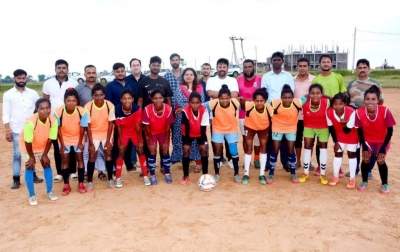Ranchi (IANS) Battling all odds, many Jharkhand women have made their way into national and international football teams and become role models for others.
The women’s football team which shines at the national and international level includes a woman who was sold by her old illiterate father for Rs 25,000, another who used to work at a brick kiln and then prepare for inclusion in the football team; one who only used to get rice and salt in the name of food and another whose mother is still a domestic help, Some continued to run barefoot while another listened to the villagers’ taunts on wearing shorts. But the adversities could not deter them from achieving what they wanted.
However, the financial condition of these players who have returned after playing at the national and international level continues to be the same.
Despite that, these women are serving as role models for women from Ranchi’s Ormanjhi to Gumla’s Chainpur block who are seen sweating it out in the fields.
Born in a poor family in Ranchi’s Haldama village, Priyanka was unable to have two square meals a day. Priyanka’s parents cracked a “deal” to marry her off to a middle aged man in Rajasthan for Rs 25,000 when she was only 12 years old. A few people came to know about it and they stopped the child marriage.
Priyanka is an international level player now. She has played in many countries, including England and Denmark.
The Indian women’s team won the Danacup tournament in Denmark in 2018. Priyanka was part of the winning team.
In 2018, 24-year-old Anshu Kachhap of Irba Pahantoli village in Ormanjhi block had performed brilliantly in international tournament in England.
Anshu’s father had passed away and her mother sells ‘handia’, a rice beer.
Anshu says she wakes up at 4 a.m., mops the floor, washes the dishes, eats stale food and then goes 4 km to play football and train with other women.
These days, she is providing training to more than 160 kids and women in Ormanjhi. She is affiliated with the All India Football Federation as a D category licenced football coach.
Master Blaster Sachin Tendulkar was highly impressed with Anshu after hearing about her struggle during an event organised by UNICEF.
Sachin told Anshu to remain focused on her aim and not get bogged down by challenges.
In March, Ashtam Oraon of Banari Goratoli village in Gumla was selected in the country’s senior women’s team and later, she was selected for the U-17 national camp. Oraon’s parents are peasants and they have a small agricultural field.
Oraon has three sisters and two brothers.
Since childhood, Oraon liked football. Despite financial constraints, Oraon’s parents sent her to Saint Colombus Collegiate so that along with studies, she would get a chance to play football.
Her father Heera Oraon says that since the beginning, people used to appreciate his daughter’s skills at the game. She also won many competitions at the state level.
Heera has told his kids that they can choose any career they want and he will work hard to fulfil their aspirations.
In January Sumati, a resident of Sisai village in Gumla, got selected in the AFC Asia Cup Football senior Indian women’s team.
Last year, in the U-17 National Tournament organised in Maharashtra’s Kolhapur, she scored 18 goals in four matches. Sumati’s father is a farmer and their financial condition is not good. Overcoming all odds, she became an international footballer.
Neetu Linda of Ranchi’s Haldgam village was in the U-18 and U-19 teams of the Indian women’s football team.
In the SAFF U-18 Women’s Championship in Jamshedpur and the AFF U-19 Women’s Championship in Bangladesh, she scored two goals each.
Neetu lost her mother when she was nine years old. Her father used to work in the fields of other people while her brother used to work in brick kilns. She is undergoing training at the Ranchi-based SAI.
Talking about Neetu, her elder sister Meetu says, “Earier she used to cook food for the family in the morning. She used to work as a labourer in the agricultural fields and brick kilns at times.”
In April, Anita Kumari of Chari Hujir village in Ranchi was selected for the U-17 national camp. Earlier, she was selected for the SAFF U-18 championship in Jamshedpur. So far, playing on behalf of the state, she has scored 18 goals.
Anita’s mother says, “I have five daughters. I am a labourer and was the breadwinner of the family, Anita’s father is a drunkard and does not care for the family. We did not have money to fill our stomachs.”
“My fourth daughter Anita and her younger sister were interested in football. Neighbours used to taunt me that I am spoiling my children as she used to wear half pants but today when my daughter’s success stories are published in newspapers, then those same people praise her,” Anita’s mother added.
Sudha Ankita Tirkey of Danapur village in Gumla was selected for the U-17 national camp. Despite being cash-strapped, her family encouraged her to play football.
Jeetu and Manjhi — parents of Poornima of Jumhar, Bazar Toli in Simdega, who has been selected for the national camp — are labourers. The family lives in a mud house.
Football has helped Seema Kumari of Ormanjhi block to reach Harvard University. In 2012, Seema used to play on behalf of an organisation ‘Yuva’, which trains women footballers.
Football gave her the confidence to fight against child marriage and for the Right to Education.
She was mocked for wearing shorts while playing football, but she did not bother. Last year, she was selected by Harvard University for a full scholarship for higher studies. Seema’s parents are illiterate and work in a field and a thread factory.
In June, Jharkhand’s women’s football team emerged as runners-up in the India Youth games, organised by the Ministry of Youth Affairs and Sports in Panchkula, Haryana.

